Diplomatic Bluebook 2017
Chapter 2
Japan's Foreign Policy that Takes a Panoramic Perspective of the World Map
1.Russia
(1) Situation of Russia
A Internal Situation in Russia
After the “annexation” of Crimea in March 2014, President Putin won the overwhelming backing of public opinion. President Putin maintained high approval ratings throughout the year 2016 even though the Russian economy continued to be in a predicament. In the State Duma (lower house) elections in September, the ruling party “United Russia” won 343 seats (out of 450 seats), far more than the two-thirds (300 seats) necessary to amend the constitution.
B Russian Economy
Since the second half of 2014, the Russian economy has been greatly impacted by the fall in international oil prices and economic sanctions by the West, resulting in a falling ruble and share prices, but in 2016 the depreciation of the ruble stopped as a consequence of rising oil prices, and inflation also stabilized, so there was a sense that the Russian economy had bottomed out. The growth rate in 2015 was minus 2.8% whereas in 2016 it was only minus 0.2%. However, the improvement of production is slow, and signs of a stable recovery in consumption and investment, etc., have not been seen.
C Russian Diplomacy
Russia and the European countries/U.S. were in confrontation regarding sanctions over the Ukrainian situation, the response to the situation in Syria, the field of missile defense, etc. In January 2017 President Trump took office in the U.S. and in Europe, elections are planned in France, Germany, etc., in 2017. Future prospects for Russia-U.S. relations and Russia-Europe relations will be attracting attention.
On the other hand, regarding China, the two countries continued to maintain a close relationship, although stagnation of economic projects between Russia and China are seen due to the slowdown of the Chinese economy. They have been conducting joint naval exercises since 2012 and they conducted them in the South China Sea for the first time in 2016. Russia also deepened cooperation with China by beginning the actual provision of weapons under a contract for exporting the latest weapons to China, which was concluded in 2015. In the international arena, Russia also cooperated with China at the UN and in multinational frameworks that Russia places importance on, namely BRICS (Brazil, Russia, India, China and South Africa) and the Shanghai Cooperation Organization (SCO).
In the Middle East, since Russia launched airstrikes in Syria in response to the request from the Assad Administration in September 2015, Russia has been increasing its presence in the Syria situation.
(2) Japan-Russia Relations
A Japan-Russia Relations in the Asia-Pacific Region
In recent years, Russia places importance on the development of the Russian Far East and the East Siberia and has been proactively enhancing relations with the states in the Asia-Pacific region that is a center of the growth of global economy. The development of the relations with Russia as a partner in the Asia-Pacific region contributes not only to Japan's national interests but also to peace and prosperity of the region. Japan and Russia have developed cooperative relations in various fields including security, economy and human exchange; whereas, the Northern Territories Issue restricts development of Japan-Russia relations. While placing importance on close relations between the leaders and foreign ministers, the Government of Japan is strenuously working to resolve the Northern Territories issue and conclude a peace treaty with Russia.
B The Northern Territories and Negotiations for Conclusion of a Peace Treaty
The Northern Territories Issue is the greatest concern between Japan and Russia. Japan's position is that the four Northern Islands belong to Japan. The Government of Japan has been energetically continuing negotiations with Russia under its consistent policy of concluding a peace treaty with Russia through the resolution of the issue of the attribution of the four Northern Islands on the basis of the agreements and documents made by the two sides so far, such as the Japan-Soviet Joint Declaration of 1956, the Tokyo Declaration of 1993, the Irkutsk Statement of 2001, and the principles of law and justice2.
In 2016, political dialogue was carried out actively, in particular there were four summit meetings and three foreign ministers' meetings. In the Japan-Russia Foreign Ministers' Meeting in April, the ministers confirmed that they would create a solution acceptable to both countries, despite differences in the historical interpretations and legal positions of the two countries. And at the Japan-Russia Summit Meeting in Sochi in May the two leaders shared the view that the two countries should actively proceed with negotiations through a “new approach” that is not stuck in a traditional way of thinking and in order to overcome the current negotiation stalemate and make a breakthrough. Based on this, negotiations toward the conclusion of a peace treaty were held between the foreign ministries of the two countries in June and August. At the Summit Meeting in Vladivostok in September, in a serious yet candid atmosphere with only the two leaders present, they spent time holding a discussion for making concrete progress in the negotiations based on a “new approach”. Subsequently, preparations were advanced for the visit of President Putin to Japan in December through the Foreign Ministers' Meeting on the occasion of the UN General Assembly in September, the Summit Meeting on the Occasion of the APEC Economic Leaders' Meeting in Peru in November, and the visit to Russia of Foreign Minister Kishida in December. On the other hand, moves such as the development of military facilities, in particular the announcement of the deployment of surface-to-ship missiles on Etorofu and Kunashir islands (in November), and giving names to unnamed reefs, etc., are contradictory to the Government of Japan's position regarding the Northern Territories issue and it made protests.
At the Summit Meeting in Yamaguchi when President Putin visited Japan in December, the two leaders held a candid and in-depth tete-a-tete discussion on the peace treaty issue for one hour and 35 minutes, and as a result, they expressed their sincere determination to resolve this issue. Based on this, they agreed to commence discussions on undertaking joint economic activity on the four Northern Islands under a special arrangement, and agreed to improve procedures for the former island residents to make grave visits, etc. Taking into consideration the heartfelt appeal of the former island residents, whose average age has already exceeded 80 years old, the Government of Japan intends to advance steadily toward a resolution of the issue step by step while also putting the outcomes of this meeting into practice.
Japan is actively working on projects contributing to the improvement of atmosphere for resolution of the Northern Territories Issue, such as the four-islands exchange program, free visits, and visit to graves. Japan is also promoting cooperation such as disaster prevention and ecosystem conservation in adjacent areas of the two countries including the four Northern Islands.
The Government of Japan is approaching and coordinating with the Russian side in order to ensure safe operations for Japanese fishing vessels in the waters surrounding the four Northern Islands and to continue the fishing of salmon using an alternative fishing method to the prohibited driftnet fishing.
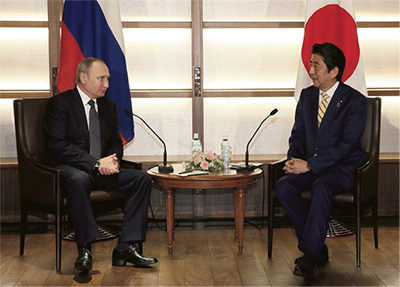 Japan-Russia Summit Meeting (December 15, Nagato City, Yamaguchi Prefecture; Photo: Cabinet Public Relations Office)
Japan-Russia Summit Meeting (December 15, Nagato City, Yamaguchi Prefecture; Photo: Cabinet Public Relations Office)- 2 Way back when the Soviet Union continued denying the presence of a territorial issue itself, Foreign Minister Masayoshi Ohira proposed to refer the Northern Territories Issue to the International Court of Justice in October 1972, which Foreign Minister Gromyko of the Soviet Union turned down. At present, the Russian side admits the necessity to conclude a peace pact through bilateral negotiations with Japan, engaging in negotiations for the solution of the issue.
C Japan-Russia Economic Relations
Due to the falling prices of oil and natural gas, the major export commodities, the stagnation in the Russian economy, and other factors, Japan-Russia trade volume in 2016 amounted to approximately 16.3 billion US dollars, declining for the third straight year since the record high in 2013 (about 34.8 billion dollars) (21.6% decrease compared to the previous year, according to Japanese statistics). On the other hand, in the second half of the year (July to December) there were changes to the situation. For example, auto exports, which had been declining in recent years, began to increase. The volume of Japanese direct investment to Russia increased from 202.6 billion yen (2014) to 216.8 billion yen (2015). At the Japan-Russia Summit Meeting in Sochi, Russia in May, the eight-point Cooperation Plan for Innovative Reform in the field of Industry and Economy of Russia as a leading country of a favorable living environment proposed by Prime Minister Abe was highly praised by President Putin, and the two leaders agreed to materialize the plan. Subsequently, proposals regarding individual projects, etc., related to the plan were made by both countries and at the Japan-Russia Summit Meeting on the Occasion of the 2nd Eastern Economic Forum (in Vladivostok) in September, the progress toward materializing the Cooperation Plan was confirmed, and Prime Minister Abe proposed confirming the progress at the forum every year and President Putin welcomed this proposal.
With a view to ensuring outcomes during the visit of President Putin to Japan in November, the two countries established the Japan-Russia High-Level Working Group on the Cooperation Plan, identified priority projects, and in the same month held the 12th Meeting of the Japan-Russia Intergovernmental Committee on Trade and Economic Issues, where they agreed to accelerate the coordination of documents between the authorities of each country. At the Japan-Russia Summit Meeting on the Occasion of the APEC Economic Leaders' Meeting in Peru, the two countries welcomed the fact that agreement had been reached concerning the work plan on the Cooperation Plan. Subsequently, as a result of further coordination between the two countries, during the visit of President Putin to Japan in December, 12 documents between the governments and authorities, and 68 documents related to private companies' projects were signed in a wide range of fields including medical care, the urban environment, energy, industrial diversification, people-to-people exchanges, intellectual property, etc. and in addition the two leaders agreed to enter into formal negotiations on amending the convention for the avoidance of double taxation and announced the relaxation of visa requirements by Japan and Russia. The two leaders agreed to develop Japan-Russia economic relations, including the further materialization of the eight-point Cooperation Plan. Japan, while developing Japan-Russia relations overall going forward and intends to steadily promote mutually-beneficial cooperation regarding the economy in a wide range of fields. Furthermore, Japan Centers in six cities in Russia support the business activities of the companies of both countries and interregional economic exchanges and in addition they offer training programs, such as management courses, Japanese language classes, and training in Japan for the people who are expected to play a significant role in Japan- Russia economic relations. A total of some 82,000 Russian people have taken the courses and about 5,100 of them have visited Japan for training.
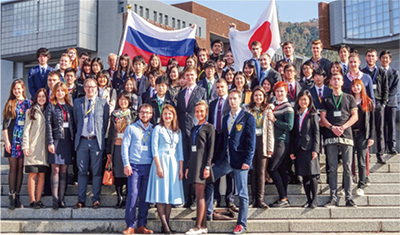 Japan-Russia Youth Forum 2016 (December 2, Hiroshima Prefecture; Photo: Japan Russia Youth Exchange Center)
Japan-Russia Youth Forum 2016 (December 2, Hiroshima Prefecture; Photo: Japan Russia Youth Exchange Center)D Cooperation between Japan and Russia in Various Fields
In 2016, discussions such as Japan-Russia Strategic Dialogue were held between diplomatic authorities from the two countries in a wide range of areas and views were exchanged on terrorism, disarmament and non-proliferation, consular services, and cyberspace, etc. Practical training for drug enforcement agents from Afghanistan and Central Asia was also implemented by officers from Japan and Russia.
In the area of security, Secretary General Shotaro Yachi of the National Security Secretariat met with Secretary Patrushev of the Security Council of Russia in November. Regarding defense exchanges, the two countries endeavored to encourage mutual understanding and prevent chance accidents by continuously implementing a range of consultations at the working level and a Japan-Russia joint search and rescue exercise. Moreover, guardships in the Border Service of the Federal Security Service of the Russian Federation came to Japan and held a joint exercise with the Japan Coast Guard.
As for human and cultural exchange, in the framework of the Japan-Russia Youth Exchange Program, youth exchanges with a variety of themes, in particular, the Japan-Russia Youth Forum and projects introducing Japanese culture in regions throughout Russia were actively implemented. Furthermore, on the occasion of the visit of President Putin to Japan in December, the two leaders agreed to hold the “Japan Year in Russia” and the “Russia Year in Japan” in 2018 and greatly expand youth exchanges as one of the measures to expand people-to-people exchanges between Japan and Russia.
Special Feature
1. Overview
From December 15 to December 16 President Putin visited Japan for the first time in 11 years, and visited Yamaguchi Prefecture, the hometown of Prime Minister Abe, and Tokyo. On December 15 he stayed at a hot spring hotel surrounded by the scenic mountains of Nagato City, Yamaguchi Prefecture, and in that calm and quiet atmosphere the two leaders held an in-depth discussion on a wide range of fields of Japan-Russia relations, including the issue of concluding a peace treaty. On December 16 they moved to Tokyo and held a summit meeting at the Prime Minister's Office, which was joined by business people, and held a Joint Press Conference. After that, they attended the Japan-Russia Business Dialogue at the Nippon Keidanren Kaikan and then visited the Kodokan Judo Institute.
2. Highlights
(1) One on one tete-a-tete meeting
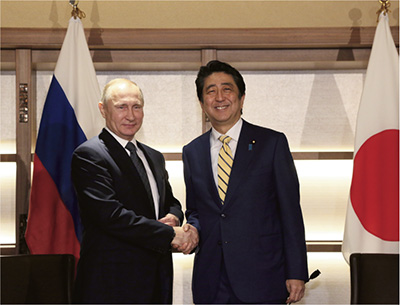 The two leaders shaking hands (December 15, Nagato City, Yamaguchi Prefecture; Photo: Cabinet Public Relations Office)
The two leaders shaking hands (December 15, Nagato City, Yamaguchi Prefecture; Photo: Cabinet Public Relations Office)The two leaders held summit meetings for five hours in Yamaguchi and one hour in Tokyo, for a total of six hours. In particular, the meeting of the two leaders just with their interpreters was carried out for one hour and 35 minutes, the longest tete-a-tete meeting to date, and the two leaders discussed the issue of a peace treaty face-to-face. As a result, the two leaders agreed to commence consultations on a special arrangement for undertaking joint economic activity on the four northern islands, and agreed to improve the procedures for former island residents to visit their family graves, etc. Furthermore, at the meeting Prime Minister Abe handed a letter written in Russian by former island residents to President Putin directly.
(2) Joint Press Conference
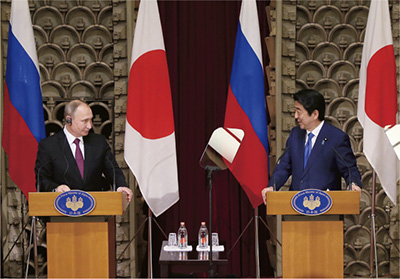 Japan-Russia Joint Press Conference (December 16, Tokyo; Photo: Cabinet Public Relations Office)
Japan-Russia Joint Press Conference (December 16, Tokyo; Photo: Cabinet Public Relations Office)At the Joint Press Conference held in the Prime Minister's Office on December 16, Prime Minister Abe stated “even today, after 71 years since the end of World War II, a peace treaty has not been concluded between Japan and Russia. Our generation must put an end to this extremely unnatural state of affairs with our own hands” and President Putin stated “If anyone thinks that we are only interested in building economic relations and we give low priority to a peace treaty, they are wrong. I think the most important thing is the conclusion of a peace treaty.” In this way, the two leaders expressed their own determination to resolve the peace treaty issue in the press conference as well.
(3) Working Dinner
At night on December 15 when the two leaders were staying in Yamaguchi Prefecture, a Working Dinner was held for approximately two hours. At the Working Dinner, cuisine featuring copious amounts of ingredients from the local Yamaguchi Prefecture and local sake were served, and the meeting was conducted in a genial atmosphere with no ties. Furthermore, Prime Minister Abe gave President Putin the gift of a reproduction of the Japanese painting Putyatin's Arrival, which portrays a historical scene of Japan-Russia friendship pertaining to the signing of the Japan-Russia Treaty of Commerce, Navigation and Delimitation in 1855, the starting point of Japan-Russia relations.
(4) Kodokan Judo Institute
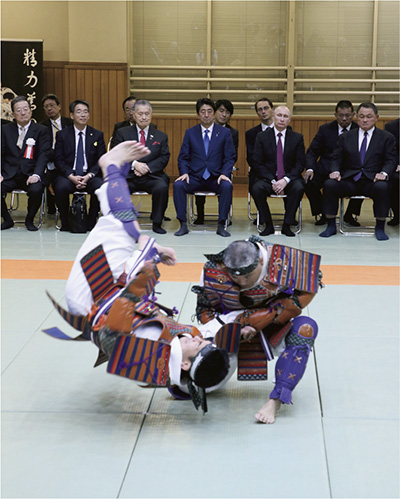 The two leaders visiting the Kodokan (December 16, Tokyo; Photo: Cabinet Public Relations Office)
The two leaders visiting the Kodokan (December 16, Tokyo; Photo: Cabinet Public Relations Office)On December 16, as the final event during President Putin's visit to Japan, the two leaders visited the Kodokan. President Putin is known as a judoka who has the ranks of Kodokan sixth dan and International Judo Federation eighth dan, and he says that one of the people he respects is Mr. Kano Jigoro, the founder of the Kodokan. At the Kodokan President Putin enjoyed demonstrations of old-style judo while listening to an explanation from Mr. Yasuhiro Yamashita, a gold medalist in judo at the Los Angeles Olympics in the open category.

